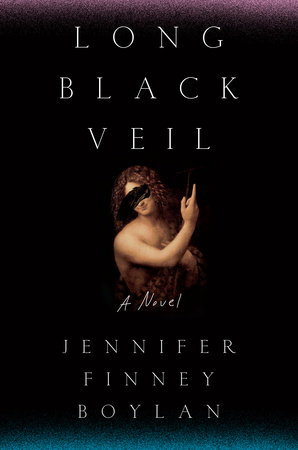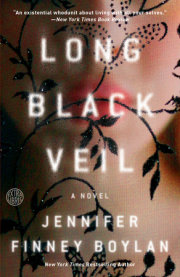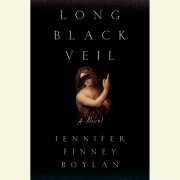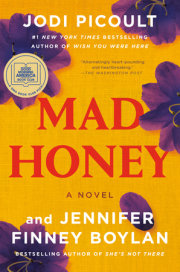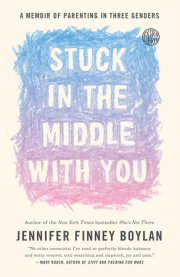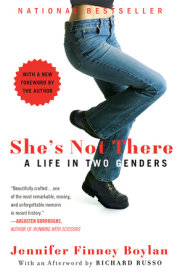***This excerpt is from an advance uncorrected copy proof***
Copyright © 2017 Jennifer Finney Boylan
Chapter 1
Philadelphia, Pennsylvania
August 1980
This was a long time ago, before my first death, and none of us now are the people we were then. Instead we are ghosts: two of us dead, a third unrecognizable, a fourth suspected of murder. It would be easy enough at this hour to have contempt for those young selves, to focus instead on how much cleverer we have become here in the green pastures of the twenty-first century. But over the years I have come to believe that people are usually more deserving of forgiveness than judgment. This is not only because it’s an act of grace; it’s also because most men and women aren’t afforded the luxury of dying more than once.
Unlike some people I could mention.
It was Rachel who got us out of our beds that hot August morning, even though our heads were still throbbing from the wedding the night before. But Rachel was a woman on a mission, and she’d decided she was going to take Quentin to see The Large Bathers by Cézanne, or perish in the attempt. She was all about the Impressionists then. Before they graduated, when she was in her Renaissance phase, she’d taken a crack at painting Quentin’s portrait in the manner of Leonardo da Vinci’s John the Baptist, but instead of being flattered, he got all sore about it. That’s what you think I look like? he said, hurt that she did not see him the way he saw himself. But hello. Of course he looked exactly like that.
Later, it had been Tripper’s idea to walk from the Philadelphia Museum of Art to Eastern State Penitentiary. It wasn’t far. He’d been a history major at Wesleyan, and he’d always wanted to check out the medieval-looking ruins. The prison had opened in 1829, and closed only eight years before, in 1972. Since then it just sat there in the heart of Philly, all boarded up, while the city tried to figure out what to do with it.
Maisie looked at the sketchy neighborhood into which they had strayed. "Do we have to do this?" she said. She had long blond hair and a mole in the middle of her left cheek.
"When the prison was built this was all green fields," Tripper said.
His nickname contained no small degree of irony, given that he was the most conservative of the group and the only trips he had any intention of taking were ones to the Grand Caymans. At birth he'd been christened Tobin Owen Pennypacker III, though, and his father (Tobin Owen Pennypacker Jr.) had taken to calling him Triple for short. Over time, "Triple" had inevitably morphed to "Tripper."
"It's not a very good neighborhood," noted Maisie.
"Will ye not fuck yourself," inquired Wailer. It was a rhetorical question.
A bottle smashed in an alley behind one of the row houses to their right. "Sorry," said Maisie. "I just don't like the idea of getting mugged."
"Hey man, nobody's mugged you so far," said Casey. He was a generously obese young man wearing a striped engineer's hat upon his head. The groom.
"But it's early yet," suggested Wailer. She was wearing black fingernail polish. The bride.
"No, we should keep going," said Rachel. She had a big head of bushy black hair, but even at twenty-two there were streaks of gray. "Quentin has got his heart set on the prison now." In her painting, Quentin had pointed with one hand toward the heavens. The other hovered over his heart. It was some likeness.
It was August of 1980. Carter was still president, Reagan an unlikely joke. There were hostages in Iran, fifty-two blindfolded souls. The Bicentennial, with its tall ships and fireworks, was a recent memory. John Lennon was alive. Now and again there'd be a story in the news about how the Beatles were going to come together once more, perhaps in order to raise cash for some charity. Everyone figured it would happen, sooner or later. Why shouldn't they?
They were six in all, plus Krystal and the boy. Quentin and Casey and Tripper had known each other since high school, out at Devon Boys' Latin on the Main Line. Later, the three of them went to Wesleyan, which is where they'd met Rachel and Wailer. They'd only graduated three months before, June first. Plans for the future were sketchy.
The day was hot and sticky. Their clothes stuck to their bodies.
On the street ahead, Rachel saw Quentin talking to Herr Krystal, his former teacher, and now his friend. The two of them had been yammering away in German all morning. It had kind of wrecked their visit to the Cezannes, in fact. All Rachel had wanted was to look upon The Large Bathers with Quentin, to have him see what she saw. But Quentin had hardly paid The Large Bathers any mind at all. Instead he just yakked away with Krystal in a language that sucked the beauty directly from the air. It was worse than the Black Speech in Tolkien. Ash. na'{_g gimbatu!, suggested Hitler.
Benny, Maisie's little brother, tightened his grip on her hand. The ten-year-old had a buzz cut and enormous glasses that were always on the verge of falling off of his face.
"I'm afraid of the garble," he said.
"Well, get used to it, Benny," said Tripper. There was a gold anchor embroidered on the breast pocket of his blue sport coat. "That's what the world is! Garble and gibberish."
The boy looked at him fearfully. He and Maisie had grown up in a ruined Main Line mansion, a place called the Bagatelle, out in Vil lanova. After the exploits of their father, "Lucky" Lenfest, it was the only asset the family had left, a haunted house with a listing Victorian tower, leaking ceilings, an attic full of crap. The heart of the mansion was an elaborate spiral staircase, carved from cherry, with a pipe organ in its center. Maisie was the only one of them who hadn't been at Wes leyan. She'd gone to Conestoga High, out in Berwyn, and dated Trip per- a scandal, given Tripper's natural predilection for debutantes.
She'd wound up at the Berklee College of Music in Boston, studying organ and harpsichord.
At the wedding the night before, Wailer had come down the cherry staircase of the Bagatelle in her bridal gown as Maisie played "A Whiter Shade of Pale" on the organ. Casey stood at the bottom of the steps, best man Quentin at his side, watching the bride descend. As she drew near him, tears of joy had spilled over Casey's eyelashes and rolled down his cheeks. Wailer's parents had not come to the wedding, being dead.
A half a block ahead of them, Quentin and Herr Krystal started singing. It was the Marlene Dietrich song from The Blue Angel. Quentin had gotten Rachel to watch The Blue Angel with him one night, in the same way that she had perhaps tried to get him to look at The Large Bathers. The film had seemed to demonstrate some verity of the world , in Quentin's eyes. But all that Rachel could see was a bunch of proto Nazis, intent on breaking one another's hearts.
"Man," said Casey. "It's just like old times, the two of them, makin' sauerkraut. It's like we're in the Time Tunnell"
"Jonny hand meyer pocketknife, will you?"
"What?" said Casey. He reached into his pocket, but his knife was gone. "Wait, no! It's gone!"
Benny held up the jackknife. It bore the initials]. C. "I played a trick on you," he said.
"Benny," said Maisie. "What did we say about the stealing?" Benny wasn't moved. Casey took the knife and handed it to his bride.
"You're a criminal, little dude."
Benny pushed his glasses up his nose and smiled, satisfied.
Krystal and Quentin laughed at something in the Black Speech. Herr Krystal's hand was placed gently on Quentin's back. "Wunderbar.l Wunderbar.l" Krystal shouted.
"Bloody hell," muttered Wailer.
Since graduation three months earlier, Quentin had been living in his high school bedroom. He'd majored in modern foreign languages at Wesleyan, and was supposedly immersed in a project translating Walt Whitman into German. It didn't sound like he'd gotten very far though. He was going to call it Die Whitman Anthologie, which, as Tripper liked to point out, translated, sadly, as The Whitman Sampler. Rachel worried about Quentin, who'd seemed to have the greatest promise of their group, but since graduation the young man's boat had appeared to become hopelessly lodged upon the rocks.
"I want a kitty, can I have one?" said Benny.
"What?" said Maisie. She wasn't certain whether he was serious. Sometimes her little brother had sudden whims. "Do you think you're old enough?"
"It's a lot of responsibility, taking care of a cat," added Tripper. With his forefingers the boy picked at the cuticles of this thumbs.
There was a small wound on each thumb where he'd made himself bleed.
Quentin and Krystal stopped singing and stood still. Slowly, the
others came up behind them. There they were: the eight of them, gath ered together like the members of an a cappella group. Before them rose the high walls of old, abandoned Eastern State Penitentiary. There were arrow-slit windows, turrets at the corners. A central guard tower, covered with rust, looked down upon the ruins.
Tripper raised an eyebrow. He hadn't expected it to be quite so gruesome. Quentin pointed excitedly. "The entrance is around the side." "Entrance?" said Casey.
"We don't have to go in," said Quentin. "Just look."
Herr Krystal nodded. "Hermann Hesse said that the eyes of others are our prisons, their thoughts our cages." He was tall and thin and infirm, like a human who had somehow come down with Dutch elm disease. Even though he wasn't the boys' teacher anymore, Krystal acted a lot of the time like he was still taking attendance.
"I need me fuckin' snorkel," said Wailer. "It's got so bloody deep."
They walked up the block toward the prison's old stone gates. As they walked, Maisie imagined the Rosalyn Tureck version of the Gold berg Variations in her head, which she preferred to the Glenn Gould, on account of the groaning. Over the years, the Bach had been the music she turned to in an emergency, producing in her a calm in the face of chaos. But staring up at the towers of the old penitentiary, the Bach wasn't much help. There were some things that music was no match for, and a horrible abandoned prison was one of them.
They reached the gates. Clouds gathered in the sky above them.
Benny looked fearfully toward his sister.
"Maisie," he said, his voice trembling.
There was a creak as Quentin pressed forward on the iron door. Gently, it swung open.
For a moment they all stood there in silence, looking at the long
stone room just beyond. There was light at its far end, where a small set of stairs led out into the old prison yard. Twenty pairs of eyes peered back at them.
"Miao," said the creatures.
Chapter 2
Cold River, Maine
September 2015
The house was dark. “Gollum,” I said.
He waddled over and looked up at me with his sad, bulbous eyes. His tail thumped once against the tile floor.
“Good boy,” I said, and kneeled down to hug him. He groaned piteously.
“Come on,” I said, “let’s go up.” I left my suitcase at the bottom of the stairs. The old black lab—eleven years old now—followed me up the steps, then doddered over to our bed. Jake wasn’t in it, off at a fire I figured. Gollum jumped in, as if it were the last action he would commit upon this Earth. The dog glanced at me with his rheumy, grateful eyes, then lay his head down on my husband’s pillow and moaned. Gollum, Gollum.
A pair of loons called to each other out on the lake, the bird-world equivalent of a married couple’s late-night argument—the male laugh- ing, the female responding with a melancholy hoo. It wasn’t hard to translate: I’m here, I’m here, are you listening, I’m here! And the reply, Yeah, I know where you are.
I crossed the hallway to the room where our son, Falcon, lay in his bed fully dressed, arms spread like a man on the cross. His mouth was open. I stood in his doorway. It wouldn’t be long now before he graduated, another nine months, and then Jake and I would be alone in the big house. On his desk Falcon’s schoolbooks were piled high. His French horn lay by the foot of the bed, the case open, a music stand over by the window.
Once, he'd been a two-year-old, lying in a crib in a room not un like this one. Back then I feared that the slightest breeze might carry him off. There had been days when I'd stood by the crib, my heart filled with equal measures wonder and fear. The sunlight had slanted through the window and reflected off of the pumpkin pine floorboards, filling his room with golden light.
Back in my bedroom, I put on a green cotton nightie with a silk screen of a baleen whale on it, and got into bed next to Collum. Now deep into his dotage, the black lab's face was mostly gray. I turned off the light and lay there for a moment, wondering if my mind was going to be able to slow down. I'd woken that morning in a hotel room in Manhattan, after two days of researching a story on Hart Island, the Potters Field of New York. I don't know why I thought the Hart Island story was going to go anywhere: it wasn't exactly the kind of story magazines use to fill what they call the blue pages-photos of Caribbean oceans, models luxuriating in infinity pools. Some of the things I'd seen on Hart Island were going to be hard to forget: prisoners in orange jumpsuits, coffins in a long trench, white guards with ma chine guns trained on black men. Even the landscape was gruesome: the summer sun shining down on the deteriorating buildings of the abandoned hospital for the insane. I'd stood for a while in front of a collapsed structure filled with rusted gears and steam engines. There was a rusted sign: THE DYNAMO ROOM.
I'd begun the day in the Algonquin, had breakfast down in the lobby, and looked over my notes, trying to figure out the hook for the story. A cat crawled around my ankles and then hopped up on the couch. Steam rose from my coffee cup.
Later, I made my way to LaGuardia. It was there, as I waited to be X-rayed by security, that I saw the headline on the front of the Post, and the photograph of the unearthed corpse. A sophomore from Penn named Shannon Savage had found it, an intern on an archeology project at Eastern State Penitentiary, and she'd been digging around in one of the rooms in Cell Block 5. The skull had rolled out of the wall and stopped at her feet. She'd picked up the skull for a moment and held it Yorick-style, not believing it was real.
The photo in the Post was grisly, a close-up of the skull. It didn't look like the person I had known.
Of course, we'd always assumed that the day had ended in murder. So no, it wasn't exactly a surprise. But it had taken all these years for the corpse to turn up, and it was still shocking. Standing there in the line at LaGuardia, I felt all the hairs on my arm stand up. This was it. It was all going to get churned up again.
A TSA agent yanked me out offline and said, You've been selected for extra screening, ma'am.I know these things are random, but it was hard not to take it personally, the suggestion that there's something about you that's not quite right.
People had been telling me this for years. I remember when I first got my passport, my mother had looked at my photograph and said, "It looks in this photo like you have a secret."
I'd laughed it off, but Mom wouldn't let it go. "Is there something
you want to tell me? You know I will always love you, no matter what." She said this in the way people always say this, pledging their unconditional love before knowing what the actual conditions are.
I thought about my mother, wondered whether she was dead or alive.
The TSA agent encircled my body with an electronic hoop, a de vice that squelched and squealed at my joints and organs. The man was wearing a name tag that said NABOKOV, like the novelist. I couldn't remember what his theories were. I thought of the line from Pale Fire: Was he in Sherlock Holmes, the follow whose / Tracks pointed back when he reversed his shoes?
Then the guard said, "Okay. You can go, ma'am."
I'd stood there for a moment in relief. Seriously? I thought. I can just be on my way? It seemed so unlikely that the thing I had been hoping for was the thing I had been given.
Now, safely home, I lay in bed for another hour listening to the loons calling to each other. I thought about the friends of my youth: Tripper and Casey, Wailer and Rachel, Maisie and Quentin. I wondered what the world would have been like, if that door in the old prison had never creaked open, and those creatures had never gazed upon us? Even now I could see those cold eyes glowing in the dark, asking the questions to which, all these years later, I still had no answer. What is this world? What is this life?
A loon cried in the dark night. I know where you are.
. All rights reserved. No part of this excerpt may be reproduced or reprinted without permission in writing from the publisher.

